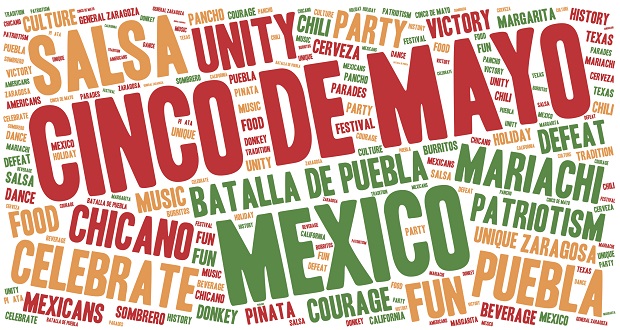
If you follow my posts, you know I’ve written about Mexican culture several times. I lived there for most of last year and I have a real deep love for the people and culture. As you may know this week was the annual celebration of Cinco de Mayo—a Mexican-turned-US holiday. What you may not know is that the American fascination with this holiday is interesting to say the least. For a quick summary of 5 (Cinco) interesting facts about the holiday read here. At least two are worth mentioning: One, and contrary to popular belief, Cinco de Mayo is not Mexico’s Independence Day (that’s September 16th) and two, Cinco de Mayo is probably more popular in the US than in Mexico—at least in terms of popularity and dollars spent. The day is celebrated in Mexico, but not nationally; its mostly celebrated in the region of Puebla where the Mexican army once fought off the French—on the 5th of May. In fact, last year I asked a friend in Mexico City how big the celebrations of Cinco de Mayo were —they asked me what was Cinco de Mayo. But on the other side of the border it has become a billion dollar day of Coronas, Margaritas, and ridiculously large Sombreros. I live in NC, and like many cities, we have a yearly bar crawl to celebrate this historic…umm battle? I have read that in the South Western part of the country and Chicago there are more authentic festivals with more traditional foods that resemble true Mexican culture but most celebrations fall far short of authenticity.
This post could have been all about how we’ve missed the mark of authenticity in celebrating Mexican heritage—or how we’ve missed—or not cared—about the point altogether. But if I’m honest, I like a night out with friends eating tacos as much as the next guy—even if they’re not authentic (or anywhere close). And I think if we’re being honest, most people use the holiday as an excuse to do just that. But I still think there is much to be learned in our fascination with Cinco de Mayo. Part of it is just a natural consequence of being so close and intimately tied to our sister country right next door. Mexicans are the largest Latino group in US and share a long complicated history with our land and people. This is no secret. But our celebration of Cinco de Mayo also says a lot about our relationship with Mexico and immigration more broadly.
I have said this before, but I think cultural appropriation is very complex, controversial and complicated topic. There are blurred lines around when adopting and imitating another’s culture becomes mimicry, mockery, or admiration—or some mixture of all. Many of these boundaries fall around contextual factors, personal motivations and power–who can do the adopting of whom. It comes up when white pop-stars adopt and imitate certain black cultural styles. Is this a positive sign of appreciation? Is it mockery? Or envy? Or lack of one’s own cultural style? Is culture anyone’s for the taking? Is there a responsibility to give credit? Admittedly, these are issues I’m still thinking through.
But Cinco de Mayo this year has helped with think about appropriation in a new light. It is undeniable that the US has a serious love with Mexican food. But what about Mexican people? It was less than a year ago when protestors marched in border towns telling lonely immigrant children to go back to the dire conditions that they escaped from. There were no Coronas, fajitas or sombreros. It is an example of loving a culture on one’s own terms and conditions. It is loving a culture when it’s convenient—or loving the most convenient parts of the culture. Now, do I know if the same folks heartedly celebrating Cinco de Mayo actually oppose immigration reform? No, but by sheer numbers the odds are that many do.
So do I think that every taco and Corona should be served with a brief history of Mexican heritage or a plea for immigration reform? Again, no. But I do think we should have a conversation about some of our hypocrisies around our relationship to appropriating other cultures when it’s convenient for us. Because the similarities are striking to the way we “celebrate” having undocumented cheap labor in many industries while opposing equitable rights and benefits to protect those employees. Ultimately, I think Cinco de Mayo provides a helpful lesson on the complexities of cultural appropriation. At its best, it is sign of adoration and respect; but at its worst, cultural appropriation enjoys the fruit of a culture while ignoring the deep and beautiful roots that produced it—its people.


















